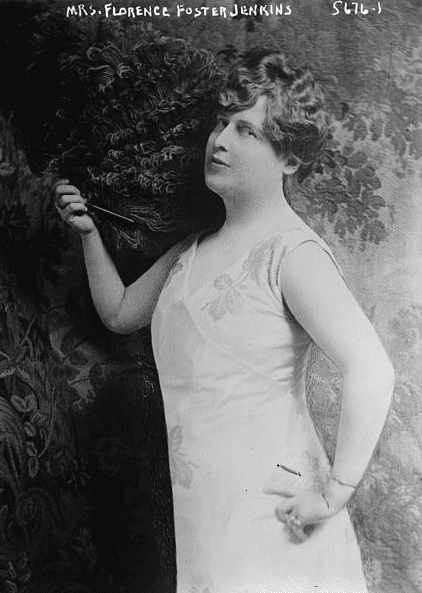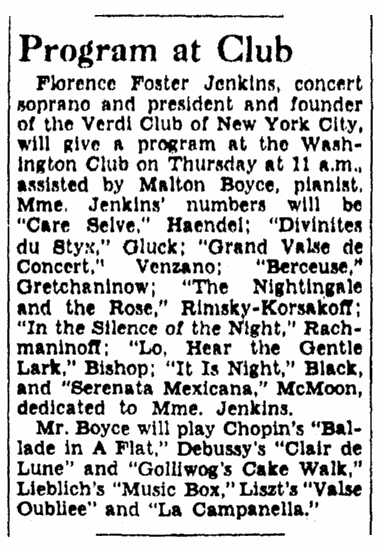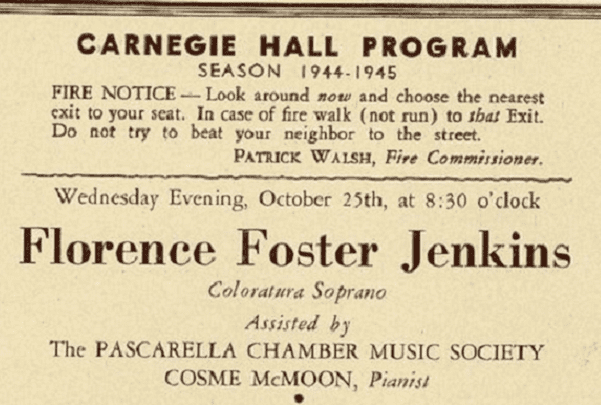Introduction: In this article, Gena Philibert-Ortega searches old newspapers to learn about Florence Foster Jenkins, an unusual story about a woman who couldn’t sing – yet gave occasional opera concerts and even once sang to a sold-out Carnegie Hall. Gena is a genealogist and author of the book “From the Family Kitchen.”
A recent movie starring Meryl Streep and Hugh Grant portrays a most unusual subject: Florence Foster Jenkins is the true story of a woman who was passionate about singing and performing. Unfortunately, that passion wasn’t the result of outstanding talent.

Florence Foster Jenkins (1868–1944) was famous, or perhaps infamous, because her singing was, to be frank, awful. Even so, she gave occasional concerts and even a one-night singing performance at prestigious Carnegie Hall in New York on 25 October 1944, one month before she died.
In a world where countless television shows document people using their talents to compete for prizes and a chance at fame, why would a studio make a movie about a woman who couldn’t carry a tune? Like all good stories, Florence’s life was filled with tragedy, drama, and comedy. Aside from depicting Florence’s horrible vocals, the movie’s story is one that portrays the resolve needed to accomplish far-reaching goals.
From Child Prodigy to So-So Adult
Florence Foster Jenkins was born 19 May 1868 to Charles Dorrance Foster and Mary Jane Hoagland in Wilkes-Barre, Pennsylvania. Her wealthy father was a lawyer and banker as well as a member of the Pennsylvania legislature. It’s easy to laugh off one of the worst singers to ever publicly perform, but Florence was at one time considered quite accomplished.
As a child she was a piano prodigy who played for President Rutherford B. Hayes. As she grew older her musical aspirations were not financially supported by her father. After his death, her ample inheritance made it possible for her to pursue her musical interests – which included singing lessons. Her social status meant that Florence moved around in society circles devoted to culture. In New York, she supported opera by founding the Verdi Club and volunteering for groups that supported the arts, including her time as president of the American Pen Women.

Unfortunately for Florence, her money bought false approval and accolades from friends and acquaintances. Despite what people really thought of her singing, Florence did achieve some popularity, first by performing for her friends – who provided a captive audience – and then later for those who enjoyed her in a more comedic vein. Florence once sold out Carnegie Hall, and her contemporary fans included such well-known musicians as Cole Porte and Lily Pons, as well as a later admirer in rock legend David Bowie.*
Her Records
Florence’s wealth allowed her to finance her musical career, including her professional recording of five 78rpm records for the New York record label Melotone. Her intention was to sell these records to friends, but they became novelty items outside of her social circle and have been re-released decades after her death for their unintentional comic appeal.** Titles of her re-released records include Florence Foster Jenkins: The Glory (????) of the Human Voice (RCA Victor 1962) and Florence Foster Jenkins and Friends: Murder on the High Cs (Naxos Nostalgia, 2003).***
While Florence’s records have achieved a cult following, not everyone was enamored with them. A 1944 San Diego newspaper article showed disdain for Jenkins’ recordings and their fans. It reported that:
A number of local record fans with a taste for the bizarre are collecting recordings of the sound effects produced by Mrs. Florence Foster Jenkins, who is not quite a soprano, although she sings in the upper register. For that matter, singing isn’t the right word for Mrs. Jenkin’s art. There should be a new word for what she does with the human throat.
Concert at Carnegie Hall
Carnegie Hall has been a New York institution for over 125 years. Music’s greats have entertained audiences there including Duke Ellington, Benny Goodman, and the Beatles. From jazz to Rock and Roll, many performers have listed playing Carnegie Hall as a dream.
Not surprisingly, it was also Florence’s dream. Florence paid to perform in Carnegie Hall in 1944 accompanied by the Pascarella Chamber Music Society Quartet, a flutist, and Florence’s pianist Cosme McMoon. Surprisingly, Florence’s concert was the fastest sold-out concert in the Hall’s history, and was in such demand that scalpers were asking $20 for $2 tickets.****
The movie Florence Foster Jenkins suggests that her common-law husband St. Clair Bayfield spent years protecting her from those who would mock her or write scathing reviews. Typically, her concert audiences consisted of friends and acquaintances who were easier for St. Clair Bayfield to control – but that was not the case for her Carnegie Hall performance.
After that infamous concert, harsh reviews can be found in newspapers published the next day – including this one filed by Richard S. Davis in the Milwaukee Sentinel-Journal.
Among other nasty comments, Davis wrote:
People laughed when Mme. Jenkins teetered forth to sing, but if she heard she never showed it. And when she actually got down to business and emitted the cheeps that distinguished her runs and trills the laughter became a roar.
And this:
You can’t be blamed for disbelieving, but the truth is that the blissful dowager on the platform seemed completely unaware that 3,000 persons were laughing at her – not politely, mind you, but uproariously and in gales. She delivered line after line of her ballad with nothing but her moving lips as evidence that she was singing.
After Her Dream
Florence Foster Jenkin’s biggest achievement, playing Carnegie Hall, would also be her last performance. Five days after the concert she suffered a heart attack and died a month later.
So what happened to those who survived her? Florence had no decedents. Her ever faithful companions, St. Clair Bayfield and piano player Cosme McMoon, assumed that they would stand to inherit some of Florence’s money. Unfortunately, Jenkins’ will disappeared after her death and both men had to go to court for a stake in her inheritance.
Even after Jenkins’ death, it would seem the popular press still had laughs at her expense. In 1945, the Sunday newspaper magazine American Weekly ran an article titled “Discordant Diva’s Missing Will” which was largely a critique of her singing and less about her missing will. Calling her the “tone-dumb darling of the tone-deaf” the author spends only a few sentences pointing out that Jenkins had left real estate, money, and jewelry, but no one could locate her will.
The article featured this unflattering headline.
It also included this sarcastic photo and caption.
The article’s text was no less sarcastic.
For Madam Jenkins was a soloist in the best tradition of the hoot owl and bullfrog, and the cash register jingled a merry roundelay whenever she exposed her robust shape to the soggy slings and arrows of outraged music-loving audiences.
While Florence Foster Jenkins’s story may seem unique, she actually has not been the only tone-deaf singer who has gained some fame; she has had other musical successors throughout the years. One who achieved a measure of notoriety was Mrs. Elva Miller, a California woman who in the 1960s gained fame by recording albums of rock songs that earned her a few spots on the Billboard Hot 100 list. Like Jenkins, Mrs. Miller recorded records and was infamous for her unique style. She was occasionally compared to her predecessor, Florence Foster Jenkins.
A much-heard motivational phrase in today’s world is: “follow your bliss.” That’s exactly what Florence Foster Jenkins did. Despite her many detractors, Florence was passionate about singing and she did not let anyone step in her way.
—————————–
* David Bowie Presents: Florence Foster Jenkins (1944). My Pretty Baby Cried She Was A Bird. http://shewasabird.blogspot.com/2013/10/david-bowie-presents-florence-foster.html
** Florence Foster Jenkins. American National Biography Online. http://www.anb.org/articles/18/18-03857.html
*** Ibid.
**** Ibid.
